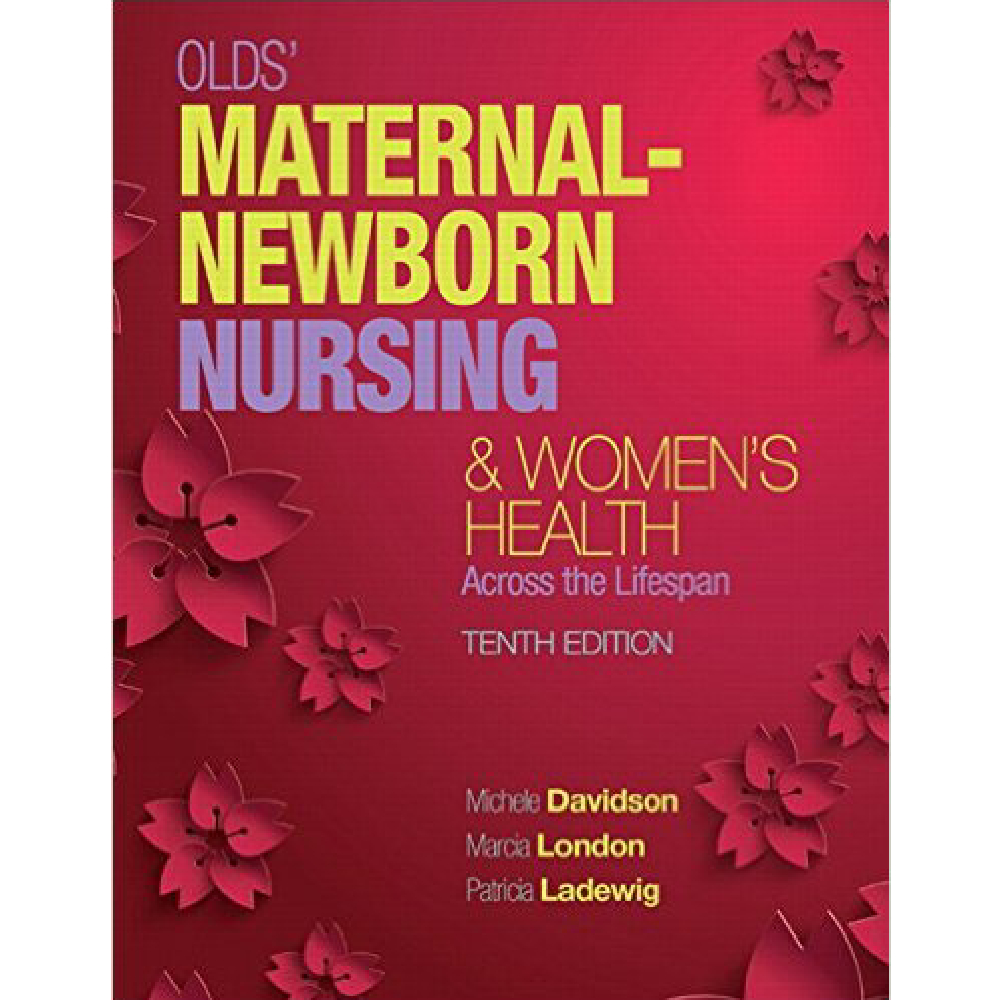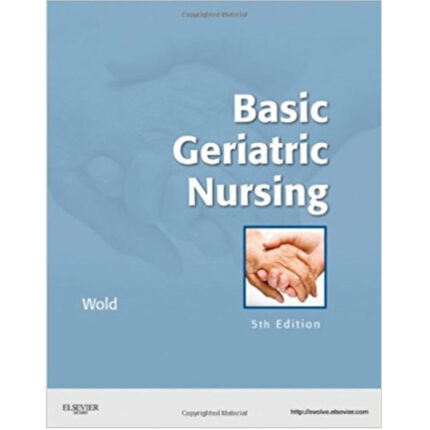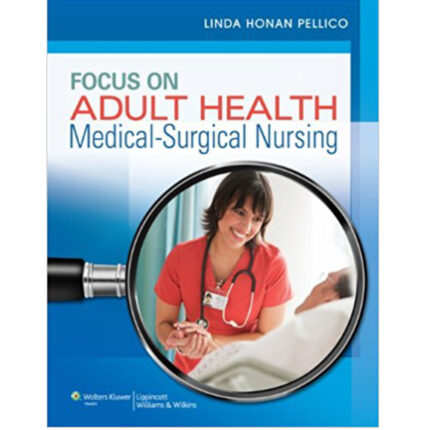Olds’ Maternal Newborn Nursing & Women’s Health Across The Lifespan ,10th Edition By Michele C. – Test bank
Chapter 11 Special Reproductive Concerns: Infertility and Genetics
1) During the initial visit with the nurse at the fertility clinic, the client asks what effect cigarette smoking has on the ability to conceive. What is the nurse’s best response?
1. “Smoking has no effect.”
2. “Only if you smoke more than one pack a day will you experience difficulty.”
3. “After your first semen analysis, we will determine whether there will be any difficulty.”
4. “Smoking can affect the quantity of sperm.”
Answer: 4
Explanation: 4. The quantity and quality of male sperm are affected by cigarette smoking.
Page Ref: 194
Cognitive Level: Applying
Client Need/Sub: Health Promotion and Maintenance: Lifestyle Choices
Standards: QSEN Competencies: I. B. 10. Engage patients or designated surrogates in active partnerships that promote health, safety and well-being, and self-care management. | AACN Essentials Competencies: IX. 7. Provide appropriate patient teaching that reflects developmental stage, age, culture, spirituality, patient preferences, and health literacy considerations to foster patient engagement in their care. | NLN Competencies: Relationship-Centered Care: Communicate information effectively; listen openly and cooperatively. | Nursing/Integrated Concepts: Nursing Process: Implementation
Learning Outcome: 1 Compare the essential components of fertility with the possible causes of infertility.
MNL LO: 1.3.1 Explain infertility and its associated risk factors.
2) A couple is seeking advice regarding what they can do to increase the chances of becoming pregnant. What recommendation can the nurse give to the couple?
1. The couple could use vaginal lubricants during intercourse.
2. The couple should delay having intercourse until the day of ovulation.
3. The woman should refrain from douching.
4. The woman should be on top during intercourse.
Answer: 3
Explanation: 3. This is the correct answer, as douching can alter sperm mobility.
Page Ref: 195
Cognitive Level: Applying
Client Need/Sub: Health Promotion and Maintenance: Self-Care
Standards: QSEN Competencies: I. B. 10. Engage patients or designated surrogates in active partnerships that promote health, safety and well-being, and self-care management. | AACN Essentials Competencies: IX. 7. Provide appropriate patient teaching that reflects developmental stage, age, culture, spirituality, patient preferences, and health literacy considerations to foster patient engagement in their care. | NLN Competencies: Relationship-Centered Care: Communicate information effectively; listen openly and cooperatively. | Nursing/Integrated Concepts: Nursing Process: Planning
Learning Outcome: 1 Compare the essential components of fertility with the possible causes of infertility.
MNL LO: 1.3.1 Explain infertility and its associated risk factors.
3) The nurse is teaching an infertile couple about the causes of infertility. The nurse tells them that infertility can be caused by which of the following?
Note: Credit will be given only if all correct and no incorrect choices are selected.
Select all that apply.
1. Immunological responses
2. Congenital anomalies
3. Patent fallopian tubes
4. Hypothyroidism
5. Favorable cervical mucus
Answer: 1, 2, 4
Explanation: 1. Immunological responses, such as antisperm antibodies, can cause infertility.
2. Congenital anomalies, such as a septate uterus, can cause infertility.
4. Hypothyroidism is a cause of infertility.
Page Ref: 194
Cognitive Level: Understanding
Client Need/Sub: Health Promotion and Maintenance: Health Promotion/Disease Prevention
Standards: QSEN Competencies: I. B. 10. Engage patients or designated surrogates in active partnerships that promote health, safety and well-being, and self-care management. | AACN Essentials Competencies: IX. 7. Provide appropriate patient teaching that reflects developmental stage, age, culture, spirituality, patient preferences, and health literacy considerations to foster patient engagement in their care. | NLN Competencies: Relationship-Centered Care: Communicate information effectively; listen openly and cooperatively. | Nursing/Integrated Concepts: Nursing Process: Implementation
Learning Outcome: 1 Compare the essential components of fertility with the possible causes of infertility.
MNL LO: 1.3.1 Explain infertility and its associated risk factors.
4) A client and her husband have contacted their physician about fertility problems. At the initial visit, the nurse instructs them about the infertility workup. Which statement by the client would indicate that the instructions have been successful?
1. “The first test that we need to schedule is a semen analysis.”
2. “We need to schedule the Pap smear test first.”
3. “We need to schedule an appointment with the social worker in order to adopt.”
4. “We need to schedule an appointment with a marriage counselor.”
Answer: 1
Explanation: 1. A semen analysis is one of the first diagnostic tests, prior to doing invasive procedures.
Page Ref: 195
Cognitive Level: Understanding
Client Need/Sub: Health Promotion and Maintenance: Health Promotion/Disease Prevention
Standards: QSEN Competencies: I. B. 10. Engage patients or designated surrogates in active partnerships that promote health, safety and well-being, and self-care management. | AACN Essentials Competencies: IX. 7. Provide appropriate patient teaching that reflects developmental stage, age, culture, spirituality, patient preferences, and health literacy considerations that foster patient engagement in their care. | NLN Competencies: Relationship-Centered Care: Communicate information effectively; listen openly and cooperatively. | Nursing/Integrated Concepts: Nursing Process: Evaluation
Learning Outcome: 2 Describe the elements of the preliminary investigation of infertility and the nurse’s role in supporting/teaching patients during this phase.
MNL LO: 1.3.2 Examine the assessment process for male and female infertility.
5) A nurse working in an infertility clinic should include which information in her discussions with the clients?
1. It is important to know the statistics surrounding couples who never learn why they are infertile.
2. Couples should understand the legal controversy concerning therapeutic insemination.
3. Couples should seek marriage counseling before undergoing fertility treatments.
4. Couples should discuss therapeutic insemination and in vitro fertilization as alternatives.
Answer: 4
Explanation: 4. This is the correct answer. This information should be presented to clients so that they are aware of all the alternatives and can make an informed decision.
Page Ref: 200
Cognitive Level: Understanding
Client Need/Sub: Health Promotion and Maintenance: Health Promotion/Disease Prevention
Standards: QSEN Competencies: I. B. 3. Provide patient-centered care with sensitivity and respect for the diversity of human experience. | AACN Essentials Competencies: IX. 3. Implement holistic, patient-centered care that reflects an understanding of human growth and development, pathophysiology, pharmacology, medical management, and nursing management across the health-illness continuum, across lifespan and in all healthcare settings. | NLN Competencies: Relationship-Centered Care: Communicate information effectively; listen openly and cooperatively. | Nursing/Integrated Concepts: Nursing Process: Assessment
Learning Outcome: 3 Summarize the indications for the tests and associated treatments, including assisted reproductive technologies, that are performed in an infertility workup.
MNL LO: 1.3.3 Recognize the various strategies for managing infertility.
6) A couple is requesting fertility counseling. The nurse practitioner has identified the factors listed below in the woman’s health history, and knows which of them could be contributing to the couple’s infertility?
1. The client is 38 years old.
2. The client was 13 years old when she started her menses.
3. The client works as a dental hygienist 3 days a week.
4. The client jogs 2 miles a day.
Answer: 1
Explanation: 1. As the eggs of older women age, their fertility is reduced.
Page Ref: 197
Cognitive Level: Applying
Client Need/Sub: Health Promotion and Maintenance: Health Promotion/Disease Prevention
Standards: QSEN Competencies: I. B. 1. Elicit patient values, preferences, and expressed needs as part of clinical interview, implementation of care plan, and evaluation of care. | AACN Essentials Competencies: IX. 1. Conduct comprehensive and focused physical, behavioral, psychological, spiritual, socioeconomic, and environmental assessments of health and illness parameters in patients, using developmentally and culturally appropriate approaches. | NLN Competencies: Relationship-Centered Care: Communicate information effectively; listen openly and cooperatively. | Nursing/Integrated Concepts: Nursing Process: Diagnosis
Learning Outcome: 1 Compare the essential components of fertility with the possible causes of infertility.
MNL LO: 1.3.1 Explain infertility and its associated risk factors.
7) A client calls the urologist’s office to receive instructions about semen analysis. What does the nurse instruct the client to do?
1. Avoid sexual intercourse 24 hours prior to obtaining a specimen.
2. Use a latex condom to collect the specimen.
3. Expect that a repeat test might be required.
4. Expect a small sample.
Answer: 3
Explanation: 3. A repeat semen analysis might be required to adequately assess the man’s fertility potential.
Page Ref: 200
Cognitive Level: Understanding
Client Need/Sub: Health Promotion and Maintenance: Health Promotion/Disease Prevention
Standards: QSEN Competencies: I. B. 10. Engage patients or designated surrogates in active partnerships that promote health, safety and well-being, and self-care management. | AACN Essentials Competencies: IX. 7. Provide appropriate patient teaching that reflects developmental stage, age, culture, spirituality, patient preferences, and health literacy considerations to foster patient engagement in their care. | NLN Competencies: Relationship-Centered Care: Communicate information effectively; listen openly and cooperatively. | Nursing/Integrated Concepts: Nursing Process: Implementation
Learning Outcome: 2 Describe the elements of the preliminary investigation of infertility and the nurse’s role in supporting/teaching patients during this phase.
MNL LO: 1.3.2 Examine the assessment process for male and female infertility.
8) A client scheduled a laparoscopy. After the procedure, what does the nurse instruct the client to do?
1. Stay on bed rest for 48 hours.
2. Expect to have shoulder and arm pain.
3. Purchase a rectal tube to relieve the gas.
4. Lie on her back to relieve the gas pain after the procedure.
Answer: 4
Explanation: 4. Assuming a supine position may help relieve residual shoulder and chest discomfort caused by any remaining gas.
Page Ref: 199
Cognitive Level: Understanding
Client Need/Sub: Health Promotion and Maintenance: Health Promotion/Disease Prevention
Standards: QSEN Competencies: I. B. 10. Engage patients or designated surrogates in active partnerships that promote health, safety and well-being, and self-care management. | AACN Essentials Competencies: IX. 7. Provide appropriate patient teaching that reflects developmental stage, age, culture, spirituality, patient preferences, and health literacy that fosters patient engagement in their care. | NLN Competencies: Relationship-Centered Care: Communicate information effectively; listen openly and cooperatively. | Nursing/Integrated Concepts: Nursing Process: Implementation
Learning Outcome: 3 Summarize the indications for the tests and associated treatments, including assisted reproductive technologies, that are performed in an infertility workup.
MNL LO: 1.3.2 Examine the assessment process for male and female infertility.
9) The nurse is reviewing assessment data from several different male clients. Which one should receive information about causes of infertility?
1. Circumcised client
2. Client with a history of premature ejaculation
3. Client with a history of measles at age 12
4. Client employed as an engineer
Answer: 2
Explanation: 2. Premature ejaculation is a possible cause of infertility.
Page Ref: 194
Cognitive Level: Applying
Client Need/Sub: Health Promotion and Maintenance: Health Promotion/Disease Prevention
Standards: QSEN Competencies: I. B. 1. Elicit patient values, preferences, and expressed needs as part of clinical interview, implementation of care plan, and evaluation of care. | AACN Essentials Competencies: IX. 3. Implement holistic, patient-centered care that reflects an understanding of human growth and development, pathophysiology, pharmacology, medical management, and nursing management across the health-illness continuum, across lifespan, and in all healthcare settings. | NLN Competencies: Teamwork: Function competently with one’s own scope of practice as leader or member of the health care team and manage delegation effectively. | Nursing/Integrated Concepts: Nursing Process: Planning
Learning Outcome: 2 Describe the elements of the preliminary investigation of infertility and the nurse’s role in supporting/teaching patients during this phase.
MNL LO: 1.3.2 Examine the assessment process for male and female infertility.
10) A client is to receive fertility drugs prior to in vitro fertilization. What is the expected action of this medication?
1. Prolonging of the luteal phase
2. Stimulation of ovulation
3. Suppression of menstruation
4. Promotion of cervical mucus production
Answer: 2
Explanation: 2. In IVF, a woman’s ovaries are stimulated by a combination of medications, one or more oocytes are aspirated from her ovaries and fertilized in the laboratory, and then they are placed into her uterus after normal embryo development has begun.
Page Ref: 203
Cognitive Level: Remembering
Client Need/Sub: Safe and Effective Care Environment: Management of Care
Standards: QSEN Competencies: I. A. 1. Integrate understanding of multiple dimensions of patient centered care. | AACN Essentials Competencies: IX. 3. Implement holistic, patient-centered care that reflects an understanding of human growth and development, pathophysiology, pharmacology, medical management, and nursing management across the health-illness continuum, across lifespan, and in all healthcare settings. | NLN Competencies: Knowledge and Science: Relationships between knowledge/science and (a) quality and safe patient care, (b) excellence in nursing, and (c) advancement of the profession. | Nursing/Integrated Concepts: Nursing Process: Implementation
Learning Outcome: 3 Summarize the indications for the tests and associated treatments, including assisted reproductive technologies, that are performed in an infertility workup.
MNL LO: 1.3.3 Recognize the various strategies for managing infertility.













Reviews
There are no reviews yet.